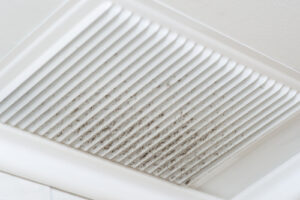You probably never give a thought to the metal ducts that deliver conditioned air to every room in your house and then return air to the furnace, heat pump or A/C to be heated (or cooled) again. Yet, clean ducts are imperative, since the various contaminants that can accumulate inside ducts can reduce HVAC efficiency, lead to unwanted smells in your home, and erode indoor air quality. This latter effect of dirty ducts can threaten the health of your family. It’s vitally important to prevent dirty ductwork.
 Why You Want Clean Ductwork
Why You Want Clean Ductwork
Maintaining (and sometimes improving) energy efficiency is one benefit of clean ductwork. When contaminants carried by dust and other debris stay in the ducts, the airflow of your HVAC system can be slowed. Anything that reduces the flow of air will force your furnace or A/C to work harder to deliver conditioned air to your rooms. The dirtier your ducts get, the harder your system has to work.
Similarly, health hazards originating in the ducts can be prevented if the ducts are clean. Contaminants such as pet dander, pollen, mold spores and even viruses and bacteria can accumulate in the ducts. Unfortunately, rodents, insects and other vermin also may get into the ducts, leaving their nests, hair, feces and dead bodies. Mold may also gain a foothold in ducts, which another good reason to prevent dirty ductwork.
Keep all this in mind as you consider conditioned air passing through dirty ducts, picking up a variety of unseemly and unhealthy contaminants. This can threaten your health, and especially that of family members who suffer from respiratory ailments and allergies.
How to Prevent Dirty Ductwork
While you should probably schedule a duct cleaning every three to five years, you can probably delay a duct cleaning a few years if you take steps to prevent dirty ductwork. Do as much as you can to keep ducts from getting contaminated in the first place.
The U.S. Office of Research Services, part of the National Institutes of Health, offers the following steps to prevent dirty ductwork. Most of them are relatively inexpensive and will help you enjoy a healthier home and more efficient heating and cooling.
- Schedule an annual preventive maintenance tune-up on your home’s HVAC system. A typical maintenance visit will include cleaning all components of your forced-air heating and cooling system (both inside and outside), component adjustments, inspection of electrical systems and venting, and checks on airflow and refrigerant (if you’re using a heat pump or A/C), among other tasks. Annual maintenance also results in improved energy efficiency, safety and performance of HVAC systems. A look at your ductwork is usually a mandatory component of annual maintenance.
- Clean your home regularly and comprehensively, since whatever you don’t clean likely will end up in your ductwork.
- Before a home renovation project, your contractor should seal vents and registers so construction debris doesn’t enter the ductwork. Sawdust, wood chips and other construction debris can easily get into ducts if you’re not careful. If you have moved into a new home, you’ll probably want to have the ducts inspected to make sure debris didn’t enter them during construction.
- If new ductwork is being installed in a new or renovated home, the installers should clean the ducts before the HVAC system is turned on. Brand new ductwork may come coated with oil, or be otherwise dirty, and some of that may get into heating and cooling components or possibly your indoor air.
- Use HVAC filters that are rated to remove the smallest particulates possible from the air, without impeding system airflow. Your heating and cooling technician should be able to advise you on the best filter for your particular situation. He may also recommend a dedicated air cleaning system.
- Schedule a duct inspection with a professional HVAC contractor on a regular basis. How often? If you keep your home clean and change the air filter regularly, you probably won’t need an inspection more than every three or four years, and might be able to get by with a duct cleaning every five years or so. On the other hand, if your home has any of combination of the following – location near dusty roads, multiple pets, indoor smokers, old carpeting and furniture, and chronically dirty air filters – you’ll probably need your ducts inspected annually.
For more advice on how to prevent dirty ducts, or help scheduling a duct cleaning for your Hampton area home, please contact us at Kearney & Sons Heating & Air Conditioning.
Image via Shutterstock.com


